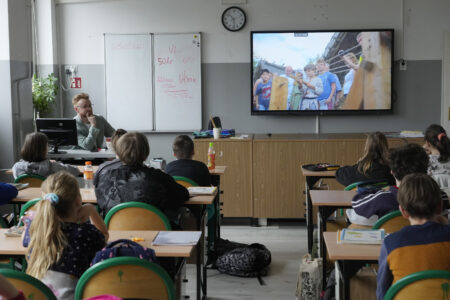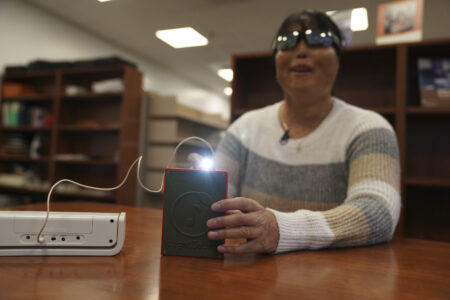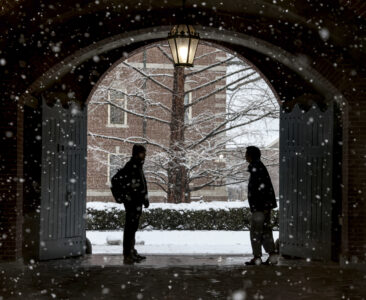New director hired at FROST
Wankmiller to lead NMU’s Forensic Research Outdoor Station

Jane Wankmiller talks about the process of reconstructing an individual based on skull dimensions at a public forum at Northern Michigan University in late May. Wankmiller, who has worked for the Michigan State Police Missing Persons Coordination Unit, was recently chosen as the director of NMU’s Forensic Research Outdoor Station, which will gather information on how the human body decomposes in cold weather climates. (Journal photo by Lisa Bowers)
- Britney Wray, a math teacher at Washington Leadership Academy, helps sophomore Kevin Baker, 15, with a math problem during class in Washington, Wednesday, Aug. 23, 2017. Students took diagnostic tests using special software. As they solved math problems on their laptops, the system diagnosed their proficiency levels in real time, part of “personalized learning.” This approach uses software, data and constant monitoring of student progress to adapt teaching to each child’s strengths, weaknesses, interests and goals and enable them to master topics at their own speed. (AP Photo/Jacquelyn Martin)
- Wankmiller
- Jane Wankmiller talks about the process of reconstructing an individual based on skull dimensions at a public forum at Northern Michigan University in late May. Wankmiller, who has worked for the Michigan State Police Missing Persons Coordination Unit, was recently chosen as the director of NMU’s Forensic Research Outdoor Station, which will gather information on how the human body decomposes in cold weather climates. (Journal photo by Lisa Bowers)
FROST will be complemented by a forensic anthropology laboratory and a human osteological collection.
Wankmiller will oversee both components while developing courses for a bachelor’s degree concentration in forensic anthropology.
Wankmiller previously worked in three capacities for the Michigan State Police, most recently as the unidentified remains coordinator in the Missing Persons Coordination Unit.
She previously conducted facial recognition searches to aid investigations through the Statewide Network of Agency Photos Unit and served as a forensic artist, drawing composites of suspects based on witness/victim interviews and reconstructing faces of unidentified decedents to help identify them.

Wankmiller
Wankmiller also is a certified death investigator, having worked on nearly 200 cases involving all manners of death.
“I was proud of the work I was doing for the MSP, but I was fascinated by FROST and viewed it as a once-in-a-lifetime opportunity,” Wankmiller said in a news release. “I also liked the challenge of building a forensic anthropology program around that.
“The university seems very forward-thinking. When you couple that with how supportive the faculty and administration are of undergraduate student research, everything came together and convinced me this is where I should be.”
As a candidate for the position, Wankmiller gave a presentation at a public forum at NMU in May. In a June 1 article in The Mining Journal, she was quoted as saying FROST has huge potential for the law enforcement community and the academic community, and that initially brought it onto her radar.
“And they seem to have an interest in new research,” Wankmiller said. “It seems like a great place to be.”
Wankmiller holds a doctorate in physical anthropology and a master’s in forensic science from Michigan State University.
The research coming out of FROST will add to what is already known about cold-climate decomposition. NMU students will assist Wankmiller in conducting these pioneering studies in varying conditions and scenarios, giving them opportunities not available at other institutions.
FROST will operate as a willed body program, in which individuals express their advance wishes to donate their bodies to the facility.
“Ideally, the person will come in to fill out the necessary paperwork and provide a social and medical history,” Wankmiller said. “This will not be an alternative for unidentified or unclaimed situations.
“And it will be different from medical schools that cremate and return the remains to family or hold a burial ceremony. We’re going to ask that our donors be forever donors. They will become part of the osteology collection for future research by forensic anthropologists and other scientists.”
FROST will offer specialized training and research opportunities for law enforcement, government agencies, military personnel and visiting scientists. Wankmiller said she is eager to establish those collaborative relationships.
“I’m familiar with the personnel and language, how cases work and the sensitivity required,” she said. “Having this facility in Michigan will improve training and continuing education for law enforcement — particularly canine teams involved in search and recovery operations.”
Wankmiller is employing an interdisciplinary approach to understanding the FROST environment and how it will impact decomposition. She has recruited a soil scientist to help analyze the ground chemistry and composition.
Wankmiller wants to test the ability of ground-penetrating radar to detect clandestine burials. Wildlife biology also will come into play as she has also talked to biologists who specialize in small animal scavengers, birds and insects.
A fellow archaeologist will conduct shovel tests to determine if there are cultural resources on the property.
The NMU Board of Trustees approved a short-term rental agreement for the site, located along a wooded bluff off U.S. 41 between the Marquette Branch Prison and the Michigan Department of Natural Resources office, at a special meeting in June after Gov. Rick Snyder in May signed a bill conveying the property to NMU.
Christie Bleck can be reached at 906-228-2500, ext. 250. Her email address is cbleck@miningjournal.net.








